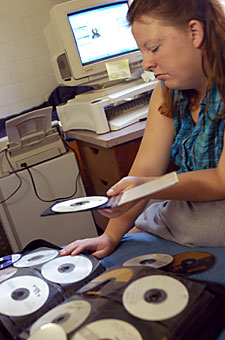 |
|
FILE PHOTO/Arizona Daily Wildcat
|
Daniele Kinsey, then a veterinary science freshman, labels burned CDs in her dorm room at Coconino Residence Hall last year.
|
|
|
By Jesse Lewis
Arizona Daily Wildcat
Monday, August 30, 2004
Print this
Even after several UA students were subpoenaed for illegally downloading music, some UA freshmen say they still plan to do so.
The Recording Industry Association of America issued subpoenas to 21 individuals and 89 universities in March.
Last year, four "John Doe" subpoenas, so named because the identities of the individuals were unknown, were served to the UA for four IP addresses.
It was the UA's job to find the owners of the IP addresses and inform them.
Two of the owners were in the residence halls, and at least one case resulted in a substantial payment, said Steve Gilmore, assistant director of Residence Life.
Universities across the country have joined with popular file sharing programs to offer downloads to students on the universities' dime. Once the student wants to burn the songs on a CD, however, the student must pay $0.99 per song.
The UA has not joined with any online file sharing companies.
If students are subpoenaed, Residence Life will issue a warning to the student whose IP address is detected illegally downloading files. At that point, students must delete the illegally obtained files from their computer.
After receiving the letter, students have a specified amount of time to respond to Residence Life and report that they have deleted the files.
If the student does not notify Residence Life, he or she will be shut down - meaning his or her IP address will no longer be able to access the Internet through UA networks - and he or she will be prevented from registering another computer.
If the student is caught again and receives another letter from the RIAA, the student is referred to the Dean of Students Office and his or her internet access is shut down.
"We will do what we need to do to make sure they will understand what will happen," Gilmore said.
The UA's Acceptable Use Policy is in the student handbook day planner that is given to every student entering the residence halls. Students also receive a small sheet of paper listing the top five reasons they could be kicked off the network. Downloading music is on the list.
"Every student must agree to the Acceptable Use Policy before registering for the network ... That is their first warning," Gilmore said.
Even with the threat of being subpoenaed, some freshmen say they will not stop downloading in place of buying the music in a record store.
"If it was worth the $15 to buy a CD, I would buy it, but half the time it's not," said Krystal Beasley, a media arts freshman.
According to an article in the Wildcat last year, the RIAA had taken action against 532 individuals for sharing music. Of those, 89 used university networks to access file sharing programs and download and share files.
The 532 individuals had, on average, uploaded 837 songs or files. The RIAA settled the cases for an average of $3,000.
Some students are aware of the consequences of downloading music and choose not to continue.
Megan Paschall, an undeclared freshman, said she used to download files illegally but has not recently and has erased the file sharing program from her computer.
"I may or I may not (download files again). In a way I feel bad because I have friends who are musicians and have produced CDs. I know they wouldn't want it so it got me thinking more," she said.
